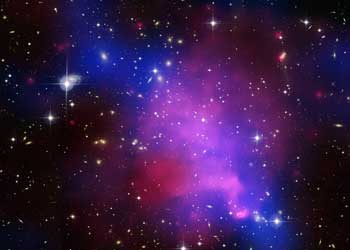"Cosmic Trainwreck" Could Challenge Our Understanding Of Dark Matter

A remarkable discovery by scientists at the University of Victoria could change the way we think about dark matter. An upcoming paper in the Astrophysical Journal by astrophysics postdoctoral fellow Andisheh Mahdavi, assistant professor Hendrik Hoekstra and professor Arif Babul describes their observation as a “cosmic trainwreck.”
Mahdavi, who discovered the collision of two swarms of galaxies while working on another project, says, “These two huge clusters of galaxies are passing through each other, and what they’ve left behind is this pool of hot intergalactic gas.” This is rare, but not unheard of. Usually, the gas stays with the galaxies, though it can be stripped off during a violent collision.
But the “trainwreck” also left something else behind—dark matter, which should always stay with the galaxies, even through a violent collision. One of the densest parts of the collision—an area of the greatest concentration of mass—has no galaxies, only gas and dark matter. No one has ever seen a dark matter peak with gas but without galaxies before, says Mahdavi.
“That kind of blew us away. If it’s true that galaxies were removed from the dark matter peak, that is a huge challenge to our understanding of how dark matter behaves.” The scientists will be using data from the Hubble Space Telescope and the Chandra X-ray Observatory in Cambridge, Mass. to confirm their findings. UVic astrophysicist David Balam and Peter Capak of the California Institute of Technology also contributed to the research.
Photo Caption: Red shows the hot gas. The individual galaxies are yellow & orange and the dark matter is in blue.
For hi-res photo: contact Jessica Gillies at gilliesj@uvic.ca
Mahdavi, who discovered the collision of two swarms of galaxies while working on another project, says, “These two huge clusters of galaxies are passing through each other, and what they’ve left behind is this pool of hot intergalactic gas.” This is rare, but not unheard of. Usually, the gas stays with the galaxies, though it can be stripped off during a violent collision.
But the “trainwreck” also left something else behind—dark matter, which should always stay with the galaxies, even through a violent collision. One of the densest parts of the collision—an area of the greatest concentration of mass—has no galaxies, only gas and dark matter. No one has ever seen a dark matter peak with gas but without galaxies before, says Mahdavi.
“That kind of blew us away. If it’s true that galaxies were removed from the dark matter peak, that is a huge challenge to our understanding of how dark matter behaves.” The scientists will be using data from the Hubble Space Telescope and the Chandra X-ray Observatory in Cambridge, Mass. to confirm their findings. UVic astrophysicist David Balam and Peter Capak of the California Institute of Technology also contributed to the research.
Photo Caption: Red shows the hot gas. The individual galaxies are yellow & orange and the dark matter is in blue.
For hi-res photo: contact Jessica Gillies at gilliesj@uvic.ca
-- 30 --
Photos
Media contacts
Andisheh Mahdavi (Physics & Astronomy) at 250-721-8655 or amahdavi@uvic.ca (Only available until Aug. 20.)
